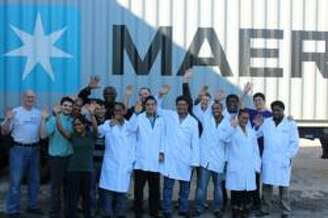By Rory Callinan in Illawarra Mercury
The appeals imply the goods will go to the poor or be recycled.
A Fairfax Media investigation has found the businesses have sophisticated networks of bins and mount slick campaigns by putting in letterboxes plastic bags featuring charity-style slogans or photos of children in Third World countries.
To stay within the law, some include a small-print declaration that they are commercial operators but charities fear consumers are tricked into donating because they do not read the fine print. Others use collection bags for fake charities.
They time campaigns to coincide with peak donation times such as before Christmas.
The donated clothing and shoes, often designer brands, is usually sorted outside Australia using cheap labour and sold in the Middle East, Africa, the Pacific and Asia.
This financial year 15,000 tonnes of used clothing were exported, raking in millions of dollars, according to international trade data seen by Fairfax.
Earnings are difficult to track but an unfair dismissal case involving one of the companies in Queensland in 2003 discussed a container of ''virgin stock'' clothing exported to Papua New Guinea as worth about $15,000.
Some of the trade originates from genuine charities onselling clothing they cannot give to the poor but it is now believed a big proportion is coming from commercial collectors.
''The losses to charities are in the tens of millions,'' said the chief executive of the National Association of Charitable Recycling Organisations, Kerryn Caulfield. ''It's taking stock away from charities, it skews the lines of governance, puts doubt in the minds of the community and impacts on the employment opportunities for people with disabilities in these charities.''
This month Fairfax Media found a commercial operator putting pink plastic bags seeking clothing donations for ''low-income families'' or Papua New Guinea ''tribespeople'' in letterboxes in north-eastern NSW.
The bags were for a second-hand clothing exporter whose director has links to a big second-hand shop and an international operation in Victoria that exports to more than eight countries. The bags carried the words, ''We need your help'', and sought clothing donations.
The small print confirmed the bag was being used by a commercial recycler. Phone numbers on the bag rang through to the PNG Recycling Centre. A website noted on the bag, www.bringthepinkbagtoschool.com.au, offers to pay schools for used clothing. The website contains an image of a collection bag showing the word cancer.
The website is registered by PNG Recycled Clothing Centre, a private company in Brisbane. The directors and shareholders are George William Doonan and Chris Kopyoto.
Mr Doonan is listed in company records as a co-director of the second-hand clothing export business Supreme Textile.
In 2001 Consumer Affairs Victoria took Supreme Textile to court for breaching fund-raising appeals legislation for raising money for a charity without the charity's permission. A Consumer Affairs spokesman said Supreme Textile had been ordered to stop fund-raising and pay about $980 in costs.
Peter Higgins, the group operations manager of Lifeline Retail in the northern rivers, the area targeted by the pink bags, said commercial exporters were ''gobbling up the market at no benefit to the local community''.
Mr Doonan said his was a commercial operation that shipped all clothing to people in PNG, most of whom were on low incomes.
He said the use of the word cancer on the website had been put in by a website designer from another site and would be corrected.
He rejected the charities' criticism of his operation and said his business gave away 35 per cent of production and had made substantial donations to charities since 1991.
''Papua New Guineans are in need of clothes and only commercial operators such as ourselves fill this need. No charity ships clothing to PNG to give away,'' he said.
''There is a need in our society for responsible recyclers like ourselves. In many areas clothing recycling is not done and the goods end up at the tip.
''Most charities I know of run shops selling the best of the clothing and either dump the rest or sell it to private operators like ourselves.'' He said he did not recall the incident involving Supreme Textile and Victorian
Consumer Affairs. ''We definitely were not fined or given any penalty. Can you give me more information so I can respond.''
Mr Doonan said many operators needed to be exposed. ''You are only touching the tip of the iceberg.''
Fairfax Media has found examples of private businesses using either fraudulent means to collect free clothing or carefully worded appeals that imply donations will go to the needy. Examples of fraudulent bag collections were recorded in Victoria in August and, in Perth, consumer affairs authorities have cracked down on an operator who had more than 150 bins.
























